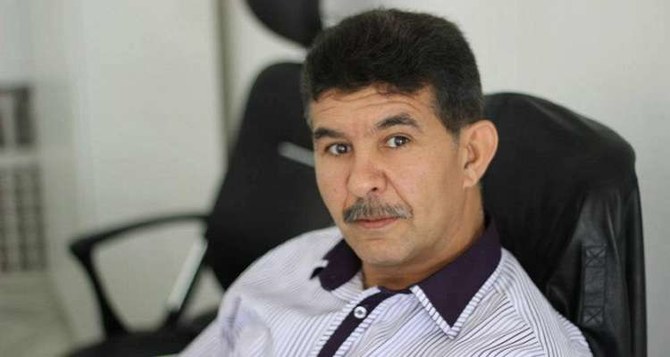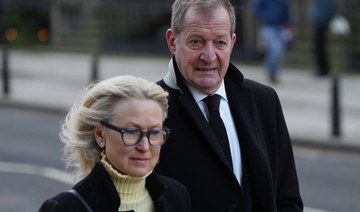Tunis: Tunisian authorities have arrested an Al Jazeera reporter, the network’s bureau chief said Thursday, as campaigners voiced concern over a growing number of journalists behind bars in the North African country.
“Samir Sassi, a journalist at the Al Jazeera office in Tunisia, was arrested after security forces raided his house” late Wednesday, said Lotfi Hajji, director of the Qatar-based television network’s bureau in Tunis.
He told AFP that police did not disclose the reasons for the arrest nor where Sassi was being held. There was no official comment from Tunisian authorities.
Hajji said the security forces had also seized Sassi’s “computer, phone, and the phones of his wife and children.”
Al Jazeera’s Tunisia bureau has been closed since President Kais Saied’s swift power grab in July 2021, but the network’s journalists remained accredited and maintained their coverage in Tunisia.
Authorities did not provide a reason for shutting down the bureau at the time.
Tunisia has come under criticism for a crackdown on the freedom of speech, including the arrests of more than 30 journalists in 2023, according to the International Federation of Journalists (IFJ).
In an open letter to Saied published on Thursday, the IFJ expressed its “deepest concern at the frequent imprisonment of journalists, in total contravention of the provisions of the Tunisian Constitution in respect of freedom of expression and the media.”
It mentioned the case of Tunisian journalist Zied El Heni, who was arrested on December 29 after criticizing Tunisian Commerce Minister Kalthoum Ben Rejeb in a radio show he hosts.
Heni became well known during the 2011 uprising that ousted dictator Zine El Abidine Ben Ali and set in motion what later came to be known as the Arab Spring.
The journalist remains in detention, awaiting trial scheduled for January 10.
“Heni’s case is not an isolated one, but clearly indicates the existence of a systematic policy of instrumentalising legal procedures and the judicial system to systematically intimidate, bully and imprison journalists,” said the IFJ.
Last summer, the United Nations human rights chief Volker Turk said he was “deeply concerned” over the crackdown on media in Tunisia, with vaguely worded legislation used to criminalize criticism.
Seventeen journalists in Tunisia currently face trial, according to local media.
Heni and some other journalists have been prosecuted under the provisions of Decree 54, which punishes those accused of spreading “false news” with a prison sentence of up to 10 years.
The legislation “is being used to silence journalists and opponents of the president,” Anthony Bellanger, general secretary of the IFJ, said earlier this week, accusing the government of “attacking journalists.”
Tunisia arrests Al Jazeera journalist: bureau director
https://arab.news/c6xau
Tunisia arrests Al Jazeera journalist: bureau director

- Al Jazeera’s Tunisia bureau has been closed since President Kais Saied’s swift power grab in July 2021
- Campaigners voiced concern over a growing number of journalists behind bars in the North African country
Islamabad High Court halts government move to block phone SIMs of non-tax filers

- Pakistan’s tax collection body asked the country’s telecom authority to block over half a million SIMs last month
- The court issued a stay order until May 27 after a telecom firm challenged the decision and called it unconstitutional
ISLAMABAD: A Pakistani court on Tuesday issued a stay order against a government directive to block cellphone SIMs of users who did not file their tax returns in 2023, as the lawyer of a telecom company argued the decision was taken in violation of the constitution.
Last month, the Federal Board of Revenue (FBR), the country’s tax collection body, ordered the Pakistan Telecommunication Authority (PTA) to block over half a million SIMs belonging to people required to file taxes but who were not appearing on the active taxpayers’ list.
However, telecom companies were reluctant to implement the directives affecting so many subscribers, prompting the PTA to urge the FBR to revisit its directive.
The discussion continued until the telecom companies decided last Friday to initiate a manual process of disabling the SIMs in small batches. It was widely reported in the local media on Tuesday the Islamabad High Court (IHC) had stayed the implementation of the cellphone blockage until May 27.
“Blocking more than 500,000 SIMs will result in a loss of Rs1 billion annually,” Advocate Salman Akram Raja was quoted as saying by Pakistan’s Geo News channel.
Raja, who was representing Zong, told the court the decision taken by the government was in violation to Article 18 of the constitution, which guaranteed freedom of trade, business and profession.
Pakistan has traditionally faced the challenge of convincing people to file tax returns, but the government has now decided to implement stringent measures to address the problem, particularly in the context of negotiations for a new International Monetary Fund (IMF) loan program.
The IMF has urged Pakistan in the past to enhance revenue collection from non-filers as part of broader economic reforms to support social and development initiatives.
In response, the FBR is taking steps like blocking the SIM cards and considering other punitive measures to enforce tax compliance and widen the tax net.
Qatar Investment Authority commits to supporting France’s semiconductor sector

RIYADH: Qatar will venture into France’s tech industry as a major investment body announced its intent to anchor a financial commitment in Ardian Semiconductor.
This move marks the Qatar Investment Authority’s participation in a pioneering thematic fund designed to enhance the semiconductor industry in Europe. It highlights its role as a preferred financial partner in key technology subsectors, including supply chain developments.
QIA’s strategic focus on this sector reflects its belief in the critical role semiconductors play in driving digital and green transformations across vital industries such as artificial intelligence, mobility, and consumer technology, according to an official release.
This initiative is part of QIA’s broader investment strategy to engage with leading businesses at the forefront of innovation.
Notably, QIA’s interest in the semiconductor value chain includes a recent minority stake in Japan’s Kokusai Electric Corp., a leader in semiconductor manufacturing, taken in June 2023, underscoring its ongoing commitment to significant investments in this area globally.
Furthermore, on May 13, QIA announced its plan to significantly expand its investment partnership with Bpifrance by as much as €300 million ($323 million), reinforcing their joint commitment to stimulating economic growth and innovation in France.
This enhancement marks a pivotal development in their collaboration, initially established through the Future French Champions joint venture.
The first phase of this partnership, concluded in 2021, effectively channeled almost €300 million into supporting job creation, economic development, and particularly bolstering the French small and medium-sized enterprises sector.
Building on these achievements, both entities progressed to the second phase of their collaboration in January 2023, committing an additional €300 million.
They now plan to embark on a third phase, pledging up to another €300 million once the current funds are fully deployed.
The renewed partnership will focus on strategic priorities such as artificial intelligence, semiconductors, quantum computing, healthcare, aerospace, and energy transition.
These investments are intended to advance technological capabilities, enhance competitiveness across various sectors, and promote sustainable growth, reflecting both parties’ commitment to driving significant innovations and supporting France’s long-term economic objectives.
OPEC sticks to oil demand view, sees improvement in global economy

RIYADH: The Organization of The Petroleum Exporting Countries stuck to its forecast for relatively strong growth in global oil demand in 2024 on Tuesday and said there was a chance the world economy could do better than expected this year.
In its monthly report, OPEC said world oil demand will rise by 2.25 million barrels per day in 2024 and by 1.85 million bpd in 2025. Both forecasts were unchanged from last month.
This is the last report before OPEC and its allies, known as OPEC+, meet on June 1 to finalize output policy. The oil alliance, in its report, sounded an upbeat tone on the economic outlook.
“Despite certain downside risks, the continued momentum observed since the start of the year could create additional upside potential for global economic growth in 2024 and beyond,” OPEC said.
ITFC’s new initiative promises to boost economic and trade growth in Central Asia

RIYADH: Economic and regional integration among the six Organization of Islamic Cooperation member countries is set to grow with a new program from the International Islamic Trade Finance Corp.
The Trade Connect Central Asia+ Program, also known as TCCA+, was launched recently by ITFC, a member of the Islamic Development Bank Group, during the third Tashkent International Investment Forum. It is poised to enhance economic growth in Kazakhstan, Kyrgyzstan, and Tajikistan, as well as Turkmenistan, Uzbekistan, and Azerbaijan.
The region, which boasts one of the world’s largest energy resources and significant production capacities in energy and agriculture, currently lacks the trade markets needed to harness its full potential, according to a press release.
In a statement at the launch, Hani Sonbol, CEO of ITFC, said: “We are immensely proud to launch the TCCA+ Program, which represents a significant step forward in enhancing economic cooperation and boosting trade across the Central Asia region and beyond.”
He stated that this initiative is designed to unlock the vast economic potential of the region by facilitating increased regional trade and investment.
“With a focus on the energy and agriculture sectors, we are committed to fostering sustainable economic growth and regional integration that benefits all member countries involved,” added Sonbol.
Focused on boosting regional trade and expanding the export base toward higher value-added products, the TCCA+ Program is anticipated to foster inclusive and sustainable economic growth, alongside promoting regional economic integration among the six targeted countries, the release added.
Saudi Arabia continues Makkah Route Initiative

- Launched in 2017 as part of Vision 2030, Initiative involves dedicated team to receive travelers
- Includes special buses to transport pilgrims comfortably on journey through Makkah and Madinah
RIYADH: The Makkah Route Initiative, implemented by the Saudi Ministry of Interior, continues to streamline pilgrims’ journeys from international airports in their own countries, Saudi Press Agency reported.
The initiative, set up to facilitate the arrival of pilgrims in the Kingdom, involves close cooperation between the ministry and various partner agencies.
Launched in 2017 as part of Vision 2030, it involves a dedicated team to receive the travelers and includes special buses to transport them safely and comfortably on their journey through Makkah and Madinah.
Services include biometrics, Hajj visas and electronic luggage coding.














